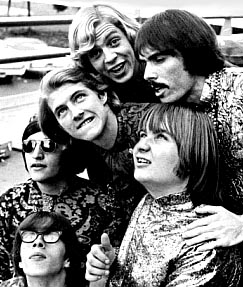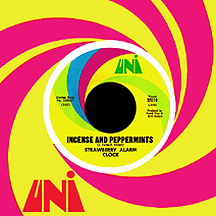STRAWBERRY ALARM CLOCK
Incense and Peppermints
The influx of British music acts that rapidly and quite suddenly stormed North American radio stations and record stores in 1964 and '65 made some of the locals nervous about being overridden on their own home turf. One gimmick a few up-and-coming U.S. bands attempted was to use fake British-sounding names, figuring it would be a better bet than if people took them for un-hip homegrown talent. San Francisco band The Beau Brummels named themselves after a King George-era military/fashion figure, while the Texas-bred Sir Douglas Quintet emerged with nary a knighted member among its ranks, certainly not San Antonio-born group leader Doug Sahm. By 1967, despite the success of Chicago's non-Westminster-based Buckinghams, the name game had moved away from aping Anglican interlopers. Thee Sixpence, a band from Glendale, California formed in 1965, reached a point where it made sense to ditch the faux-Brit name and go with the new trippier-moniker trend. Some of 1967's breakout bands had food names (Peanut Butter Conspiracy, Moby Grape) and even more bizarre combinations of edibles and gadgets such as The Electric Prunes and Chocolate Watch Band. The more "psychedelic" the music, the weirder the names became.
Thee Sixpence consisted of guitarists Ed King and Lee Freeman, along with two others who quit by the end of '66, lead singer Mike Luciano and guitarist Steve Rabe, and drummer Gene Gunnels (who also split but would one day return). Three 45s that year on the All-American label included originals ("Long Days Care") and covers ("Hey Joe"). Johnny Fairchild, the music director at top 40 station KIST in Santa Barbara, was a strong supporter, spinning a Sixpence remake of Benny Spellman's 1962 jam "Fortune Teller" (a version by The Rolling Stones had been a hot airplay track in Los Angeles that summer). It topped the station's playlist in September, which led to a deal with Dot Records to distribute the single nationally...after which the crystal ball went dark.
Mark Wietz's focus had always been on music; he'd studied piano since age eight and later gave the drums a thump or two. Towards the end of 1966 he spotted an ad posted in a music store; Thee Sixpence was looking to fill some vacant positions and in no time he was the group's new keyboard player. Gary Lovetro joined as bassist and Randy Seol became the drummer along with hanger-inners King and Freeman. Wietz wrote a song called "Heart Full of Rain," which became the band's fourth release, receiving the usual exposure in Santa Barbara but nowhere else, though by that time they were performing regularly up and down the California coast. The group's manager, Bill Holmes, pulled a fast one (as many managers did) by giving himself writer credit on the label, making Wietz wary of similar shifty moves to come. He continued writing songs and took on duties as the lead singer, though he didn't serve in that capacity on the song that would cement the group's reputation.
Becoming aware of a Detroit-based Sixpence group, they figured okay, fine, it was time to change the name anyway. Following suit with the food-named bands and being Beatles fans, "Strawberry Fields Forever" seemed like a good place to start. The "alarm clock" part wasn't inspired by the established chocolate-timepiece band, but from an old, defective clock that made scraping sounds. With that out of the way, the song that made Strawberry Alarm Clock famous didn't come about easily. Mark and Ed wrote the melody and produced a completed instrumental track, but couldn't come up with a title or any good lyrics. Holmes baffled and annoyed the band by frequently referring to the tune as "The Happy Whistler" (the melody and chord structure bears a mild resemblance to Don Robertson's 1958 hit of that title). Producer Frank Slay settled the issue by sending a copy of the master recording to Tim Gilbert of The Rainy Daze (who'd recorded a minor hit Slay had produced, "That Acapulco Gold"). Gilbert and his collaborator, John Carter, supplied a set of "psychedelic" lyrics ('Beatniks and politics, nothing is new...a yardstick for lunatics, one point of view...') and a title, "Incense and Peppermints."
Production didn't go smoothly either, as each band member took a stab at the lead vocal, but no one was happy with the results. Greg Munford, a 16-year-old singer who was starting his own band, The Shapes, gave it a try and achieved the best result. No one gave much thought to its chances for success, but reaction to the song at live shows was encouraging. It had been pressed on All-American as the B side of "Birdman of Alkatrash," the first single under the group's new name ("I.A.P." writer credit showed Gilbert and Carter but not Wietz or King, who'd written the music); Fairchild flipped the disc at KIST and soon it spread from the Cali coast to the entire country. Uni Records signed the band and in November 1967, seven months after it had been recorded, "Incense and Peppermints" reached number one on the Billboard Hot 100.

George Bunnell joined as a second bass player and until Lovetro left a few months later their roster numbered six. Stepping up to the challenge of recording nine songs in ten days, the guys banged out the Incense and Peppermints LP, a strong seller that was generally well-received by critics. They were on American Bandstand a few times in addition to Jonathan Winters' CBS variety series, Joey Bishop's late night ABC talk show and others. The Alarm Clock's most notable appearance, perhaps, was on the first regularly-scheduled episode of Rowan and Martin's Laugh-In January 22, 1968 (the series pilot had aired the previous September), as they took part in the show's many rapid-fire gags and performed their follow-up single, "Tomorrow." The band's fame was so widespread its name had become fodder for jokesters; a May '68 episode of The Carol Burnett Show had a skit where Carol and the gang staged a musical parody using the name "The Banana Wrist Watch."
"Tomorrow" spent four weeks in the national top 30 in January and February. An appearance on the big screen came in March with Psych-Out, a Haight-Ashbury/San Francisco-set "flower power" drama starring Susan Strasberg, Dean Stockwell, Jack Nicholson and Bruce Dern, featuring four S.A.C. songs including "Incense and Peppermints" and "Pretty Song from Psych-Out." Then they embarked on a tour with The Beach Boys and The Buffalo Springfield (though some shows were canceled after the assassination of Martin Luther King, Jr. on April 4, and shortly thereafter the tour was cut short). Although they mostly stayed away from alcohol or drugs (but weren't shy about dallying with female fans), the group was arrested for marijuana possession in Peoira, Illinois, but hired Melvin Belli (a slow week for the famous attorney-to-the-stars?), who quickly resolved the case. Ah, the precarious "rock star" lifestyle...mid-1968 was the peak of the band's brief time in the limelight.
Uni's suits had given them creative control for the second album, Wake Up...It's Tomorrow, but tightened the screws after sales were disappointing. The next two singles, "Sit With the Guru" ('...meditation, ooohh...') and "Barefoot in Baltimore," didn't quite ignite the charts. The third and fourth albums tanked and the group's confidence started to waver. Singer Jimmy Pitman joined and Gene Gunnels returned, replacing Seol and Bunnell. Hope for another hit rode on Broadway's Hair phenomenon of 1968 and '69; covers of songs from the red-hot musical were chartbusters for The 5th Dimension, The Cowsills and others. The Alarm Clock's take on "Good Morning Starshine" entered the charts in May of '69...the same week as another recording of the song by North Carolina-born Oliver, whose version left theirs in the dust.
They fired manager Holmes, who'd never really played straight with them, and he left behind a mountain of unpaid debts. Remaining members made good on the Uni contract by creating more music (with yet another lead singer, Paul Marshall) as several singles saw release through 1970, but none caught on. One bright spot was an appearance in director Russ Meyer and screenwriter Roger Ebert's Beyond the Valley of the Dolls, an X-rated summer '70 film that received a mainstream release through 20th Century-Fox. S.A.C. are seen doing three songs: "A Girl From the City," "I'm Comin' Home" and "Incense and Peppermints." Then the band seemed to disappear. Starting in 1985, a few diehard members of Strawberry Alarm Clock reunited and have continued performing when time aligns with regular life. George Bunnell, later member Steve Bartek and main man Mark Wietz have kept the most famous of rock's food-named acts accessible to fans.


